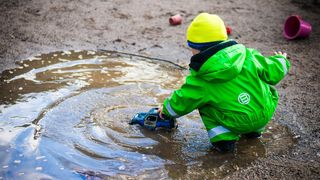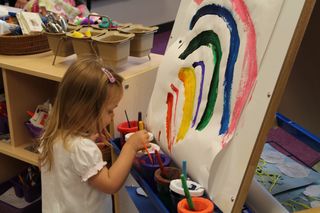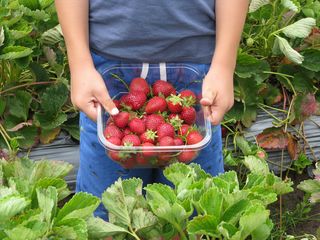Health
6 Good Things Children Can Learn from Quarantine
Discover the beneficial skills children can learn when isolated at home.
Posted May 5, 2020
We hear daily about the mental and emotional health consequences of quarantine for children—depression, anxiety, fear, and return to earlier behaviors like bedwetting. What about the good things children can and will learn from the adversity of being kept more isolated than usual? Adversity is a great teacher. As a child psychiatrist for 40 years, I will mention six helpful skills and mindsets children can grasp.
Explore Patience
Children do not fully comprehend the concept of time until age 10. Children are rooted in the present. They find it difficult to think futuristically. This makes any restriction like quarantine difficult for them because they do not grasp its endpoint.
Why can’t I see my friends, go out and play with the neighbor kids, go to the mall, go to school or see grandma? These questions bombard parents, along with when can I do these things again?

Parental assurances the restrictions are time-limited tend to be meaningless to those younger than age 10 unless linked with some personal life event: “Remember when you broke your arm and were in a cast for nine weeks?" "Remember when grandpa went on his long trip to Italy and you didn’t see him for six weeks?” “Remember how long it takes every year to get to your birthday?”
Linking your child’s experiences with waiting things out gives them a personal perspective and recall of the memory and feeling they had in the past. This linking plants the idea: You waited then and you can wait now. The same linking helps teenagers, too. They can also call up spontaneous memories of waiting for something. Children will discover they can wait and fill waiting time in a variety of ways.
Scheduling and Organizing

Home schedules are limited when children go to school every day. Their days at school are structured; at home maybe not so much. Getting themselves up, dressed, and to breakfast may be all that is necessary before school. When arriving home from school children may only change clothes and do homework. Afterward, they have free time to play. In quarantine, much more of the day requires a schedule because both school and socialization are done at home with others, who vie for the same space and who also have work and school schedules to plan for.
Children will discover how to maintain quiet while parents work at home. With parents’ help, they will organize and schedule classroom learning time, their breaks, and lunch. Hopefully, parents enforce screen time or tell their kids to take a hiatus from it.
Parents can also provide or suggest schedules around chores children can do that they otherwise would be oblivious to. Scrub sinks, drains, and toilets. Sweep. Run the vacuum. Dust. Unload the dishwasher. Change sheets. Do laundry. Learn to cook. Make a grocery list. These help all the family, teach new skills, and create high self-esteem through a sense of accomplishment and discoveries of new talents.
Boosting Creativity

Quarantine encourages children to be creative with free time. With the usual routes of play with other children, sports, and after-school activities inaccessible, parents can help children come up with things to do. Crayons or ink markers, playing cards, board games, construction paper, blocks, and Legos are good alternatives. A helpful directive is, “Go figure out what to do.”
With outside physical activities, children can be creative with boards, chalk, learning to jump rope, making an obstacle course, and so on. Later this will help with thinking outside the box when bored, confined, or when coming up with school projects to do.
Getting Outdoors

If you have a yard where children can play, this is a great option during quarantine. You can urge them to be out, physically active, either alone or with siblings. You can plan a garden with them and get them to help with digging. If no outdoor space, plan time to take them to a park or to the back alley. Let them play in the rain, build forts, or make mud sculptures.
Physical activity for 30 minutes a day boosts health mentally and physically. There is no better time to discover pleasure in bodily movement. This habit will be helpful to children’s future health.
Disconnecting Work and Play
During quarantine many families are in close quarters, competing for locations to work, do school work, and socialize or pursue entertainment. Parents help when they define zones and keep play and workspaces separate. This helps children appreciate the distinctly different mindsets necessary for the two endeavors.
If available, separate rooms work best. But, a table and chair in a bedroom corner also can be designated for schoolwork and nothing else. A simple lap desk used in a living or family room will suffice, providing it is for classwork. A designated drawer or shelf for schoolwork keeps materials organized in one place. Ask your child to create such a place.
This helps children because they may work from home as adults and need physical locale boundaries to maintain work-life balance. It is about the planning and structuring of time and space.
Sharing More
With everyone in the household jockeying for physical areas and decisions as to how and by whom time and rooms will be used, sharing is necessary. Children can be pushed to appreciate that mom’s and dad’s jobs are important and it becomes a family priority how parents can get their work done. Parents should bring this up for discussion for ideas on how to accomplish this. Who will work where? What will their hours be?
Another discussion should be around classwork for each child and how to ensure it is done–when, and in what place in the house or apartment. Mom or dad may need children’s bedrooms for their work so the children might have to work at the kitchen counter for classwork. Logistical discussions are a good idea.
This skill set of apportioning and negotiating will help children later when they share working and living quarters with others—in dorms, apartments, and during marriage.
Ensuring Emotional Health
Parents, please set up family discussion times once or twice a week to listen to fears, anxieties, hopes, views on what is going well and what is not. Not only is this a time for intimacy and partaking but also a time for parents to help children be reasonable in their outlooks and to correct misinformation about the coronavirus or about how the family is managing quarantine.
If your 6-year-old fears the coronavirus and quarantine will never end, you can reassure him or her it will and give explanations. If your 17-year-old is hopeful of having high school graduation, and this does not appear feasible, get him or her involved in planning an alternative way of celebrating graduation at home.
Be aware that children emotionally mimic parents. So if you are very anxious, or feel depressed and carry a depressive demeanor, some of your children may also. Parents should ensure they maintain their own emotional well-being. This helps your children, too.
In summary, quarantine can have these six positive outcomes:
- Cultivating children’s ability to wait and pass time.
- Providing instruction on how to set up schedules; develop organizational expertise; know how the household works; and how to negotiate with others.
- Boosting creativity by discovering how to use unplanned time.
- Increasing outdoor play and physical exercise.
- Designing how to separate work or school life from play and socialization.
- Acquiring and maintaining emotional health–evolving skills for how talking creates intimacy, allows everyone to have a say, and how problems can be aired and solved as a group.

These skills and tasks will come into use as children grow and become adults. They will discern how to bide time, think outside the box when bored or confined, and be creative with school and work projects. They will find that being less sedentary every day feels good.
If, as adults, they work from home, they will know how to maintain a work-life balance. When they live with others in dorms, apartments, houses, or during marriage, they will possess skills of how to negotiate living together.
Children can master many skills cultivated during virus quarantine. These six will provide them a lifetime of good guidance.




